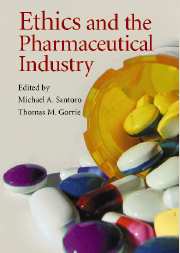Book contents
- Frontmatter
- Contents
- Tables
- Figures
- About the Editors
- Contributors
- Preface
- Acknowledgments
- Foreword
- Introduction: Charting a Sustainable Path for the Twenty-First Century Pharmaceutical Industry
- PART I PROFITS, PATIENTS' RIGHTS, AND SCIENTIFIC PROGRESS: THE ETHICS OF CLINICAL RESEARCH CONDUCTED IN PRIVATE ENTERPRISES
- Introduction to Part I
- 1 Drug Research: Between Ethical Demands and Economic Constraints
- 2 Emerging International Norms for Clinical Testing: Good Clinical Trial Practice
- 3 The Regulatory and Ethical Challenges of Pediatric Research
- 4 Including Children in Research: Participation or Exploitation?
- 5 Racial and Ethnic Inclusiveness in Clinical Trials
- 6 The Rights of Patients to Participate in Clinical Research
- 7 How Should Government Regulate Stem-Cell Research? Views from a Scientist-Legislator
- PART II MARKETING AND THE EFFICIENT UTILIZATION OF HEALTHCARE RESOURCES: ETHICAL AND PUBLIC POLICY CHALLENGES
- PART III PATENTS, PRICING, AND EQUAL ACCESS
- PART IV CONCLUDING THOUGHTS: CHARTING A SUSTAINABLE PATH FOR THE TWENTY-FIRST CENTURY
- Notes
- Index
7 - How Should Government Regulate Stem-Cell Research? Views from a Scientist-Legislator
Published online by Cambridge University Press: 04 December 2009
- Frontmatter
- Contents
- Tables
- Figures
- About the Editors
- Contributors
- Preface
- Acknowledgments
- Foreword
- Introduction: Charting a Sustainable Path for the Twenty-First Century Pharmaceutical Industry
- PART I PROFITS, PATIENTS' RIGHTS, AND SCIENTIFIC PROGRESS: THE ETHICS OF CLINICAL RESEARCH CONDUCTED IN PRIVATE ENTERPRISES
- Introduction to Part I
- 1 Drug Research: Between Ethical Demands and Economic Constraints
- 2 Emerging International Norms for Clinical Testing: Good Clinical Trial Practice
- 3 The Regulatory and Ethical Challenges of Pediatric Research
- 4 Including Children in Research: Participation or Exploitation?
- 5 Racial and Ethnic Inclusiveness in Clinical Trials
- 6 The Rights of Patients to Participate in Clinical Research
- 7 How Should Government Regulate Stem-Cell Research? Views from a Scientist-Legislator
- PART II MARKETING AND THE EFFICIENT UTILIZATION OF HEALTHCARE RESOURCES: ETHICAL AND PUBLIC POLICY CHALLENGES
- PART III PATENTS, PRICING, AND EQUAL ACCESS
- PART IV CONCLUDING THOUGHTS: CHARTING A SUSTAINABLE PATH FOR THE TWENTY-FIRST CENTURY
- Notes
- Index
Summary
THE GOVERNMENT AND MORAL ISSUES
All governments are faced with the difficult task of grappling with ethical issues upon which many scientific, philosophical, and religious leaders are unable to reach consensus. Government sponsorship of stem cell research is clearly such an issue.
Legislative issues are often heavy with ethical considerations. War and peace, for example, and crime and punishment are clearly predicated on ethical judgments, but so too are less obvious decisions on the relative allocation of resources to highway safety, school lunches for poor children, space research, AIDS in Africa, military equipment, and park preservation. These ethically based deliberations are made much more difficult when the legislators do not understand the scientific or technical issues involved.
Stem cell research is a subject that involves both ethical decision-making and science. It is generally believed that the political difficulties of stem cell research come from the ethical differences of debating parties. I suggest that they come more from a fundamental misunderstanding of the science. If so, there is a possibility of reaching consensus on regulations that would also be widely accepted by the public.
Most members arrive in the U.S. Congress with clear moral and ethical beliefs regarding human life. Generally, these convictions are based on personal and religious beliefs developed outside the public policy arena. Some are elected to office in part because of these beliefs and are unlikely to change their convictions based on Congressional debate.
- Type
- Chapter
- Information
- Ethics and the Pharmaceutical Industry , pp. 109 - 124Publisher: Cambridge University PressPrint publication year: 2005



